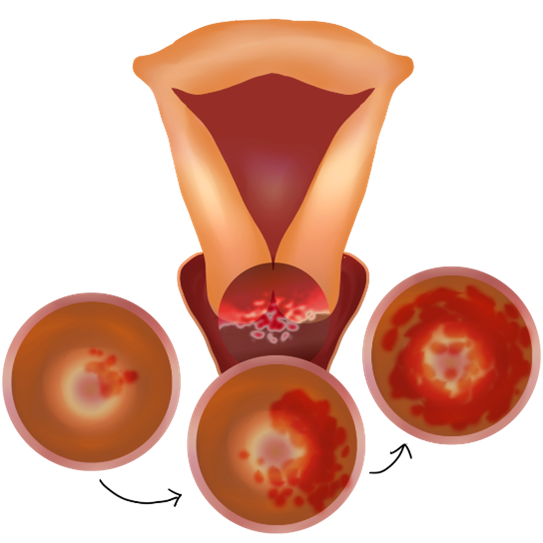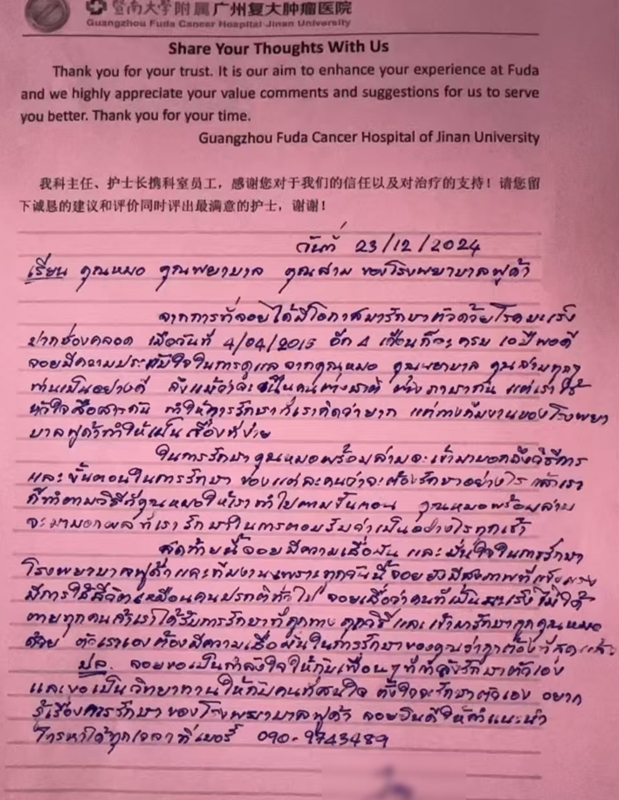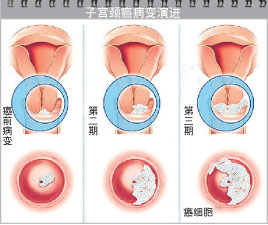"You can now travel worry-free, eat well, sleep well, and just go for regular check-ups." When Warin (a pseudonym) received another reassuring result showing no signs of tumor recurrence or metastasis, she was overwhelmed with emotions—after all, she had been battling cancer for nearly ten years.
Unusual Menstrual Bleeding Led to a Shocking Diagnosis
Warin, a native of Thailand, had always enjoyed a smooth and successful life. Through her own efforts, she had acquired a house, a car, and everything she had ever wanted. However, her once-peaceful life was abruptly disrupted when she was diagnosed with cervical cancer—a devastating blow that felt like a bolt from the blue.
In early April 2016, Warin experienced abnormal vaginal bleeding. Initially, she mistook it for her menstrual period, but when the same symptoms recurred within the same month, she realized something was wrong. She promptly visited a local hospital, where the doctor confirmed the shocking diagnosis: cervical cancer.

For Warin, a cancer diagnosis was synonymous with a death sentence. She and her husband sought treatment at multiple hospitals across Thailand, spending a significant amount of money. However, they never received a clear treatment plan and often had to wait several months before beginning treatment—an agonizing wait that left her anxious and desperate.
Later, she learned of a 72-year-old woman in Thailand who had spent a fortune on over 100 sessions of radiotherapy for cervical cancer, only to be given a mere six-month survival prognosis. However, after seeking treatment at Fuda Cancer Hospital in Guangzhou, China, the woman regained her health. Encouraged by this case, Warin immediately consulted the Fuda Cancer Hospital’s Thailand office.
"The doctors told me that my cancer hadn’t metastasized yet, meaning I had a great chance for successful treatment." To Warin, the location of the hospital didn’t matter; she was willing to go to any lengths—as long as there was a chance to save her life. By the end of April 2016, Warin arrived at Fuda Cancer Hospital in Guangzhou for treatment.
Personalized Treatment: Chemotherapy and Radiotherapy
Upon arriving in China, Warin felt anxious—not only because of her illness but also due to the language barrier. To make her feel at ease, the hospital arranged for a translator to communicate with her in Thai. The medical team conducted a thorough examination, carefully reviewed her medical history, and explained the treatment plan in detail, while also comforting her and her family.
"A small cauliflower-like lesion was found at the cervical opening, and a soft tissue mass on the left posterior cervical wall measured approximately 3.1 cm × 3.2 cm." After a multidisciplinary consultation, the experts decided to administer a TC chemotherapy regimen alongside radiotherapy. This personalized treatment plan proved highly effective for Warin:
After treatment, she no longer experienced abnormal vaginal bleeding.
A follow-up examination two months later showed that the cervical tumor had significantly shrunk.
Six months after radiotherapy and chemotherapy, the tumor had reduced to 1.2 cm × 0.9 cm.
One year later, imaging results showed that the original cervical tumor had disappeared, and no abnormalities were detected in the uterus or surrounding tissues.
Additionally, Warin underwent ozone autohemotherapy to boost her immune system and prevent cancer recurrence.
Her follow-up appointments gradually transitioned from monthly check-ups to every three months, then every six months, and eventually to annual visits. Currently, ultrasound and CT scan results confirm that her condition remains stable, with no signs of tumor recurrence.
More Than a Doctor-Patient Relationship—A Bond Like Family
"No one thinks I’m a cancer patient." Unlike other cancer patients in Thailand who underwent chemotherapy and suffered from hair loss, extreme weight loss, darkened skin, and emaciation, Warin felt incredibly fortunate—she experienced minimal side effects and complications. Jokingly, she said, "I still look beautiful. The treatment didn’t turn me into a ‘ghost’!"

During this return visit, she came not only for a follow-up check-up but also to reunite with her "family" at Fuda Cancer Hospital. As she was discharged, Warin pressed her palms together in a traditional Thai greeting, bowed slightly, and repeatedly expressed her gratitude to the doctors and nurses with a heartfelt "Khob khun ka" (Thank you). She also presented them with a heartfelt letter of appreciation.
"Of the ten cancer patients who were treated alongside me in Thailand, eight or nine are no longer alive." Warin remains deeply grateful to the Fuda medical team, whose expertise gave her a renewed lease on life. Over the past decade, she has been able to enjoy life like a normal person—indulging in delicious food and traveling freely. She feels incredibly fortunate to have met the compassionate medical staff at Fuda. Their patience, dedication, and genuine care made her feel at home, despite being in a foreign country. Although there was a language barrier, their hearts were connected.

"Sometimes, to cure; often, to help; always, to comfort." This timeless and borderless saying encapsulates the essence of medicine and has guided doctors through generations. At Fuda, patients encourage one another, doctors and patients heal each other, and medical staff work hand in hand with sincerity and warmth. Together, they brighten each other’s lives through all seasons.
For international patients who face significant challenges in seeking medical treatment, providing them with a sense of well-being, happiness, and security is not just a duty but a manifestation of the true spirit of medical compassion.
That "Unruly" Period Might Actually Be Cervical Cancer!
Cervical cancer often sends out warning signals, including:
Vaginal Bleeding
Early-stage cervical cancer may cause contact bleeding, which occurs during sexual intercourse, gynecological examinations, or after bowel movements.
In the mid-to-late stages, irregular vaginal bleeding can occur outside of the menstrual cycle. Young patients may experience prolonged or heavy periods, while postmenopausal women may notice abnormal vaginal bleeding.
Increased Vaginal Discharge
Most cervical cancer patients experience increased vaginal discharge, which may appear as blood-tinged, watery, rice-water-like, or foul-smelling secretions.
As the disease progresses, advanced symptoms may include frequent urination, urgency, constipation, and swelling or pain in the lower limbs.

